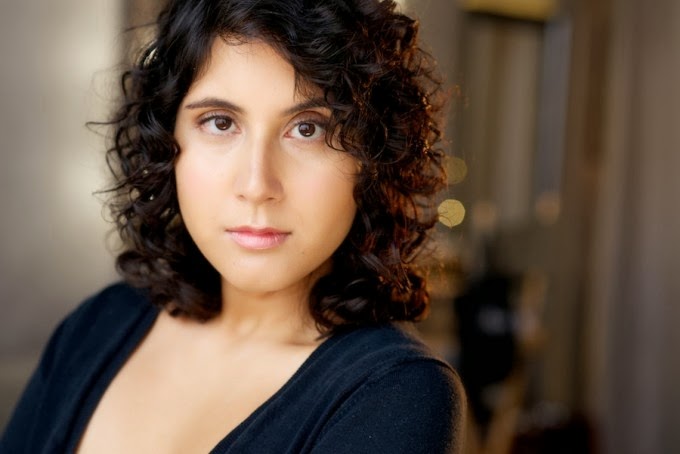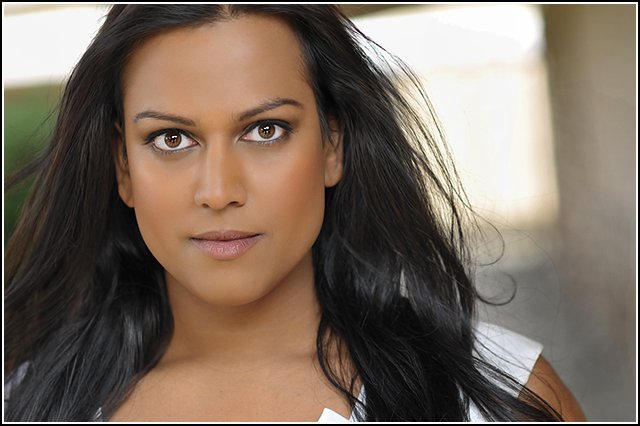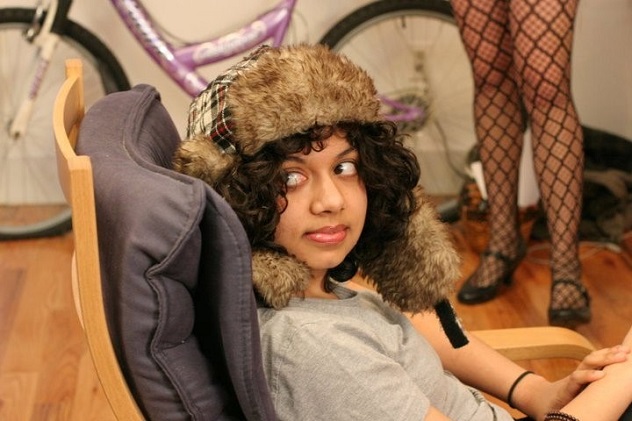
Aneesh Sheth, Janani Sreenivasan, and Sarbani Hazra are South Asian American women fearlessly telling new and uncompromising stories through indie media about what it means to be women of color today. Their stories, which live online and have screened at film festivals, are both comforting and challenging. Never conceding to normative scripts, these women’s short films offer a penetrating glimpse into how to critique racism, masculinity, and heteronormativity from fresh, funny — and dark — new perspectives. The female characters they write into being stay with you for their boldness and brass. Read more about these artists below before diving into the inspiring and revealing discussion.
Sarbani Hazra may have walked away from a career in psychology to pursue acting and directing, but it’s her degree that helps her get into the heads of the characters she’s writing or performing. She’s starred in the NBC pilot One Star Wonder, co-produced the comedy pilot Jane Don’t Date, and co-created and produced the comedy web series, Zeus School. Hazra’s own comedy web series, Bad Bonnie, which follows a naïve, plucky girl who’s unafraid to let her freak flag fly, is the Official Selection of the Miami Web Fest.

Actress, director, and writer Aneesh Sheth holds a BFA from Tisch School of the Arts. She caught our eye with Crave, a drama web series she created that spotlights the experiences of a trans woman of color looking to make waves in show business. The series was accepted at the San Francisco Queer Women of Color Media Arts Project Festival. Sheth has also appeared on the NBC sitcom Outsourced, starred in the musical Southern Comfort, and is currently debuting in the groundbreaking new musical Normativity.

Janani Sreenivasan has had, in her words, an “inchworm-like and accidental” journey toward her art, and her willingness to keep trying out new forms means she’s continually “getting [her] fingers in a whole bunch of different pies.” She has an MFA from the Iowa Writers’ Workshop and has published humor on TheNewYorker.com and on The Toast. Sreenivasan is also the creator of two short films, Serpent and Dove, and The Fir Tree, which she co-directed with Lee Jutton.

The four of us met for tea at a Japanese café a stone’s throw from the Asian American Writers Workshop, and we talked about family, fear, and all the messy ways each of them negotiated identity through their work.
Thank you all for taking the time to meet with me. What does it mean to give yourself permission to do creative work?
Sarbani Hazra: I’ve wanted to be an actor ever since I read a book about Bette Davis in third grade. I kept my ambition a secret until senior year of high school when I completed my application to an acting school in New York City. But I never sent it out because I was afraid my parents would disapprove and be disappointed with my dream.
Janani Sreenivasan: There were a few years of me needing to give myself permission to do this stuff. When we come from a communal culture, like we do, you can sometimes feel alone with your inmost thoughts, like you need to suppress them and cut them off in order to make sense to other people and not be rejected by them. You just have to keep giving yourself permission to do this.
“You just have to keep giving yourself permission to do this.”
Aneesh Sheth: Everyone kept saying to me, “Your 30s are your years. Your 30s are your decade.” I’m like, “What the hell does that mean? I’m going to be struggling in my 30s, too!” But at least for me, my career in my 30s, in comparison to my 20s, has taken a wildly different direction, and I think a lot of it has to do with giving yourself permission. Telling yourself, “I’m in a freaking rut right now and this sucks — but no, it’s not always going to be this way.”
Why did you once feel you had to ask for permission to create stuff?
AS: Fear. Especially as brown women. Mindy Kaling has this great quote — “When people say to me, ‘How do you have so much confidence?’ What I’m hearing is, ‘I’m a brown, short, chubby woman — how is it possible for me to even think highly of myself?’” We are told — as women first, but I think particularly as women of color — everything that you are is the antithesis of what is wanted and desired and held to the highest regard in this culture. For me, it was a fear of acceptance. It was also the fear of disappointing what was expected of me.
What does that mean for the work each of you puts out into the world?
AS: Not only as women but as women of color — as a trans woman of color, I have to be very conscious about what kind of work I’m putting out into the world. Growing up, I didn’t have a role model. If the only thing that comes out of [my career] is some kid is watching some program of mine and says, “Wow, there’s a trans woman of color who’s in musical theatre — that’s amazing. I’m not going to kill myself,” that’s worth it for me.
“Growing up, I didn’t have a role model.”
JS: I no longer see middle-class Caucasian-American culture — this world I grew up thinking I had to assimilate to, and wanting to decode and gain access to — as something that I have to fit into or be a part of. It’s a culture that I’m in dialogue with, but I don’t have to enter it or be accepted by it anymore. I can just work from my own space of being a global citizen, spectator, critic, which is a nice feeling.
At this this point in your lives, are you the person you needed when you were younger?
AS: I am who I wanted myself to be. And that is a very powerful thing — not just for me, but for people around me and in my community.
JS: I never really had a clear image of what I wanted to be. It’s only now that I’m beginning to get a grip on it. My mom was amazing, but her choice was to stay home. She didn’t seek out a specific career or vocation to devote her life to. As I’m getting to know myself, I think I really needed, as role models, high-powered, professional women to see and to understand how to balance a personal life and work life, how to balance a public identity as well as a domestic, private identity. I didn’t grow up knowing how to do that. I think I’m getting there.
SH: I never felt like I belonged. And I don’t think it has to do with “straddling” cultures. All my characters are sketched in a way that they’re okay with not belonging — that’s the point of art, in some ways. That was the genesis of Bad Bonnie, because so much of her is me — she just always wants to belong.
What emotions drive your work?
AS: Doubt. I either feel like I have to prove other people wrong or I have to prove myself wrong. I think a lot of artists need to embrace [doubt], because as much as it is a deterrent, I think it also forces you to examine what it is you’re doing, why you’re doing it, and what you want to put out into the world. It makes your art better. It makes the way you convey your art better.
JS: Desperation. Not necessarily to be heard by others, but to hear myself. I write and create out of a desperation to feel real, to hear and validate my own feelings. When I write, it often feels like I’m trying to punch through a wall, like I’m trying to cut through flesh. I feel like I’m trying to excavate something that’s been hidden.
“I write and create out of a desperation to feel real, to hear and validate my own feelings.”
SH: I’m going to be super cheesy but one of the emotions that drives me is love. As a comedian, it is important to embrace love. It’s more fun to write if I love something or someone. But also fear, of course — I do the things that I’m scared of the most.
What’s the role of humor in writing? What can humor convey that other forms cannot?
SH: I love humor because it breaks the tension and it comes from such a human place. You can really explore deep issues with humor and I think sometimes you can do more with it.
JS: With regard to my two films, I didn’t consciously set out to make them funny. What I did was try to stay really honest and to find an emotional logic, and to be constantly flipping and messing with expectations — which is where the humor arises. I don’t set out to be funny and I don’t set out to make you laugh. It’s more like I want you as a viewer to feel off balance, a little confused and uncomfortable — you don’t know what’s coming next, what you’re going to feel next, what you should feel next. I don’t want you to settle into too much of an emotional groove. I also love layering emotions of top of each other — something tragic with something absurd. Pulling the tablecloth out from underneath people and catching people off guard. It often results in laughs, as well as in other combinations of feelings. But I never want people to get too comfortable in one mood.
Aneesh, you wrote and directed Crave, an original webseries about a trans actress struggling to get her big break in show business. What was it like creating the pilot episode?
AS: I had been going in for Transparent, Orange is the New Black, Elementary — all these shows with these trans characters, and not once was I hired. I wasn’t seeing people who looked like me, or reflected my story, and that’s why I was like, “I need to write ‘Crave.’” I started writing it in 2012 — seven years after I first started my transition. What I also wasn’t seeing were stories about people later in their transitions. Most of the stories I saw were about “the transition” itself. That’s not the entire existence for trans people. That’s cis people saying that that’s the most interesting part of our lives, when, in fact, the most interesting part of my life has been after I transition. There’s so much more that’s happened to me in my life.
What’s at stake if you three don’t keep telling these stories? What do we risk missing out on?
AS: I think we have power. We may not feel like we have power on a day-to-day basis. But ten years from now, someone might see Bad Bonnie or Crave and say, “These were made by brown women.” I think that’s what’s at stake — the generations that come after us, the artists that come after us, their work.
SH: Sometimes, I feel like, “There are so many of us [actors],” and I just wonder, “Do I really need to do this? We have Mindy and Priyanka…” These women, though, are so different, and their voices are so different from mine. I think, as artists, we have to remember that every voice is important.
“I think, as artists, we have to remember that every voice is important.”
JS: For a long time, I’ve had the feeling of, “somebody else did it, somebody else did it” — which, I’ve learned to make peace with. Rather than be like, “Now I’m not going to be ‘the one,’” I’m sort of adjusting to the idea of, “We are many!” That’s really liberating, because that frees me to make the things that I actually want to make, rather than have to feel the burden of representation.
Just because Aziz Ansari has done something doesn’t mean I can’t now. There isn’t limited space. There’s so much space.
AS: The Grey’s Anatomy character Christina Yang once said in an interview that she had to live her experience on that show. Her purpose was not the show but lived through the show. I think it’s important for us as artists to remember and accept that. Our life and our stories aren’t about getting that one gig or that one job. It’s about our work. Our work is living through that role. We’ll move on to something else eventually, or another show. But it’s about finding our purpose through a show. Our work isn’t going to stop because we didn’t get this job. Our work is still going to continue. Our purpose has to be greater than our next gig.
JS: I’ve been making more space for my own work. I’m realizing I can use different forms of art to explore different themes. I realize I can make lots of stuff and it can express different aspects of me.
SH: You just find so much joy in collaboration. For me, that’s the best part, is working with other actors, and producers, and directors. That’s why I’m still in the business.
Follow each of these women on Twitter: @SarbaniHazra, @jennyvasan, and @ashmeesh.
* * *
Rajat Singh holds a master’s in anthropology from The New School for Social Research and a bachelor’s in Latin from Boston University. He writes cultural criticism and creative non-fiction for Kajal Magazine. His work has appeared in a queer South Asian anthology and is forthcoming in Papercuts.












